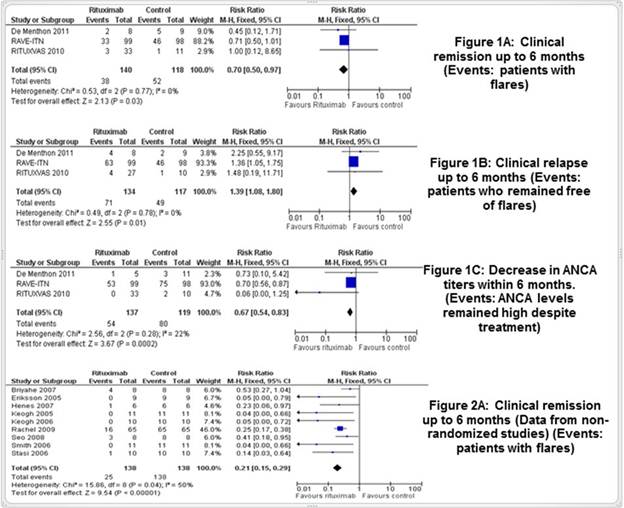Background/Purpose: Over the past 40 years, cyclophosphamide/glucocorticoids combination therapy has been the standard regimen for remission induction in ANCA-associated vasculitis.. Although a major advance in the treatment of these entities and a superior regimen to the glucocorticoid monotherapy regimens that preceeded it, non-responders and the potential for significant adverse effects have been major drawbacks.
The search for new therapeutic options has led to the investigation of anti-B cell therapies. Rituximab, an anti-CD20 monoclonal antibody, has compared favorably to cyclophosphamide-based regimens in remission induction in clinical trials, leading to formal approval by the Food and Drug Administration for this indication. It has also been able to maintain remission for many months of follow up without the need for medication-based maintenance regimens such as azathioprine which is standard in cyclophosphamide-based regimens.
Methods: All randomized controlled trials of rituximab on patients with ANCA-associated vasculitis were sought in PubMed, EMBASE, and Cochrane databases during June 2012. Significant non-randomized controlled trials were also reviewed for a separate analysis. Data was extracted by 2 reviewers and analyzed with RevMan 5 software.
Results: Three randomized controlled trials were found. In all, rituximab was demonstrated more efficacious in achieving remission, preventing relapse and decreasing ANCA titers (Figures 1A, 1B, 1C). There was also a trend favoring rituximab in achieving remission in nine non-randomized studies that were analyzed separately (Figure 2A).
Conclusion: Rituximab has been shown a new and effective alternative for achieving remission in ANCA-associated vasculitides when compared to standard cyclophosphamide-based treatment.
Disclosure:
C. Mejia,
None;
C. J. Lozada,
None.
« Back to 2012 ACR/ARHP Annual Meeting
ACR Meeting Abstracts - https://acrabstracts.org/abstract/rituximab-for-anca-associated-vasculitis-a-meta-analysis-of-randomized-trials/

